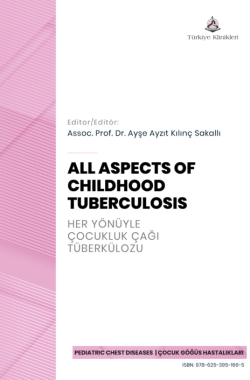Biologic Agents and Tuberculosis
Esin Gizem OLGUNa , Nazan ÇOBANOĞLUa
aAnkara University Faculty of Medicine, Department of Pediatric Chest Diseases, Ankara, Türkiye
Olgun EG, Çobanoğlu N. Biologic agents and tuberculosis. In: Kılınç Sakallı AA, ed. All Aspects of Childhood Tuberculosis. 1st ed. Ankara: Türkiye Klinikleri; 2023. p.82-4.
ABSTRACT
Biologic agents are protein-based biopharmaceuticals used in treating autoimmune and auto inflammatory diseases, acting as monoclonal antibodies or receptor or cytokine antagonists, blocking inflammatory pathways that reduce pathological inflammation. This immunosuppression increases the risk of secondary immunodeficiency, infection, or malignancy. Since treatment with biological agents, especially TNF-α inhibitors, is associated with an increased risk of TB; screening and treatment for latent TB infection (LTBI) is indicated in patients receiving such treatment. According to the Tuberculosis Network European Trials group (TBNET) consensus report, it is recommended to use tuberculin skin test (TST), Interferon gamma (IFN-γ) release assays (IGRAs), and chest X-ray together in screening for LTBI in children will use biologic agents. If TST or IGRA is positive, it is recommended to start LTBI treatment. Even if asymptomatic, patients started on anti-TNF therapy should undergo clinical control every 3 months and a radiological control every 6 months for TB disease.
Keywords: Biologic agent; tuberculosis; TNF-α inhibitors; infliximab
Kaynak Göster
Referanslar
- Dobler CC. Biologic Agents and Tuberculosis. Microbiol Spectr. 2016;4. [Crossref] [PubMed]
- Axelrod H, Adams M. Biologic Agents and Secondary Immune Deficiency. Immunol Allergy Clin North Am. 2021;41:639-652. [Crossref] [PubMed]
- Axelrod H, Adams M. Biologic Agents and Secondary Immune Deficiency. Pediatr Clin North Am. 2019;66:1007-20. [Crossref] [PubMed]
- Gardam MA, Keystone EC, Menzies R, Manners S, Skamene E, Long R, et al. Anti-tumour necrosis factor agents and tuberculosis risk: mechanisms of action and clinical management. Lancet Infect Dis. 2003;3:148-55. [Crossref] [PubMed]
- Winthrop KL, Chang E, Yamashita S, Iademarco MF, LoBue PA. Nontuberculous mycobacteria infections and anti-tumor necrosis factor-alpha therapy. Emerg Infect Dis. 2009;15:1556-61. [Crossref] [PubMed] [PMC]
- Keane J, Gershon S, Wise RP, Mirabile-Levens E, Kasznica J, Schwieterman WD, et al. Tuberculosis associated with infliximab, a tumor necrosis factor alpha-neutralizing agent. N Engl J Med. 2001;345:1098-104. [Crossref] [PubMed]
- Bruns H, Meinken C, Schauenberg P, Härter G, Kern P, Modlin RL, et al. Anti-TNF immunotherapy reduces CD8+ T cell-mediated antimicrobial activity against Mycobacterium tuberculosis in humans. J Clin Invest. 2009;119:1167-77. [Crossref] [PubMed] [PMC]
- Ramiro S, Sepriano A, Chatzidionysiou K, Nam JL, Smolen JS, Heijde Dvd, et al. Safety of synthetic and biological DMARDs: a systematic literature review informing the 2016 update of the EULAR recommendations for management of rheumatoid arthritis. Annals of the Rheumatic Diseases. 2017;76:1101-36. [Crossref] [PubMed]
- Cobanoglu N. Biologic agents and tuberculosis. Turkiye Klinikleri J Pediatr Sci. 2016;12:86-91.
- Tubach F, Salmon-Céron D, Ravaud P, Mariette X. The RATIO observatory: French registry of opportunistic infections, severe bacterial infections, and lymphomas complicating anti-TnFalpha therapy. Joint Bone Spine. 2005;72:456-60. [Crossref] [PubMed]
- Gupta A, Street AC, Macrae FA. Tumour necrosis factor alpha inhibitors: screening for tuberculosis infection in inflammatory bowel disease. Med J Aust. 2008;188:168-70. [Crossref] [PubMed]

